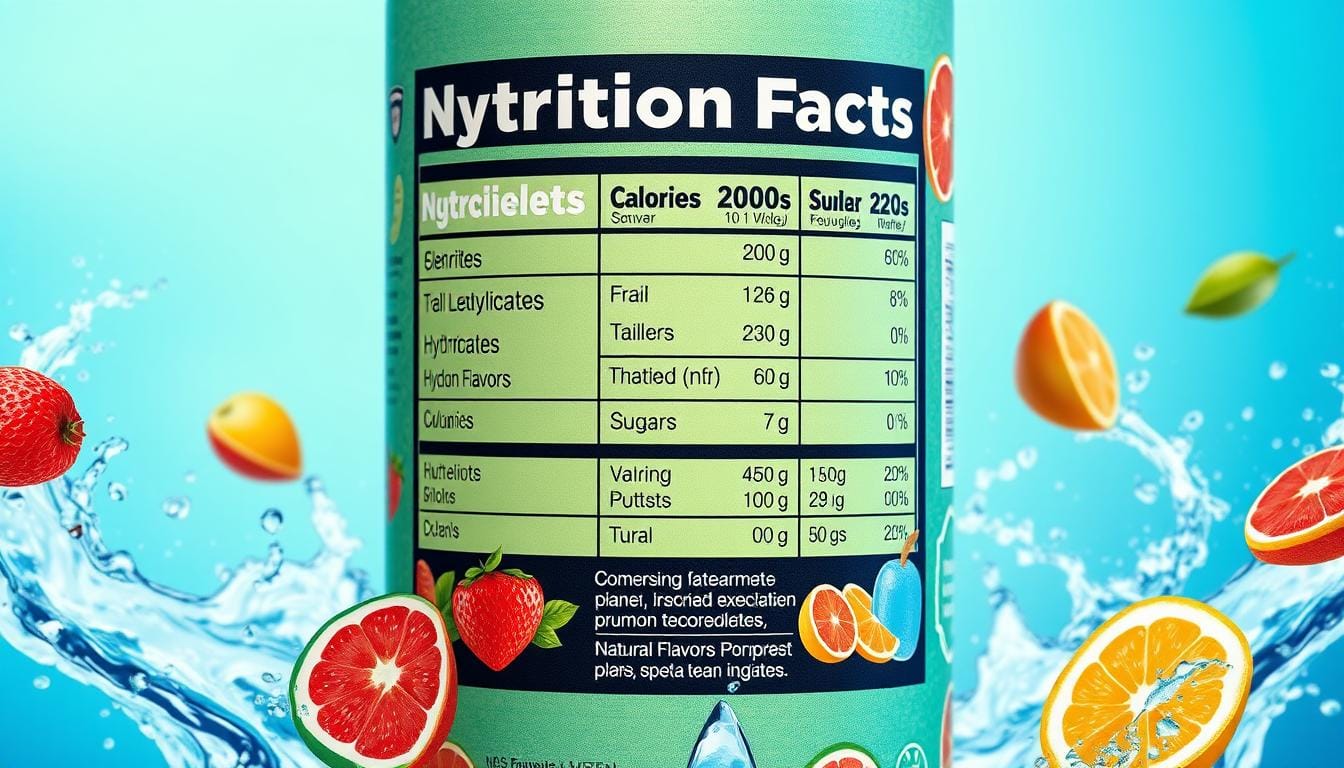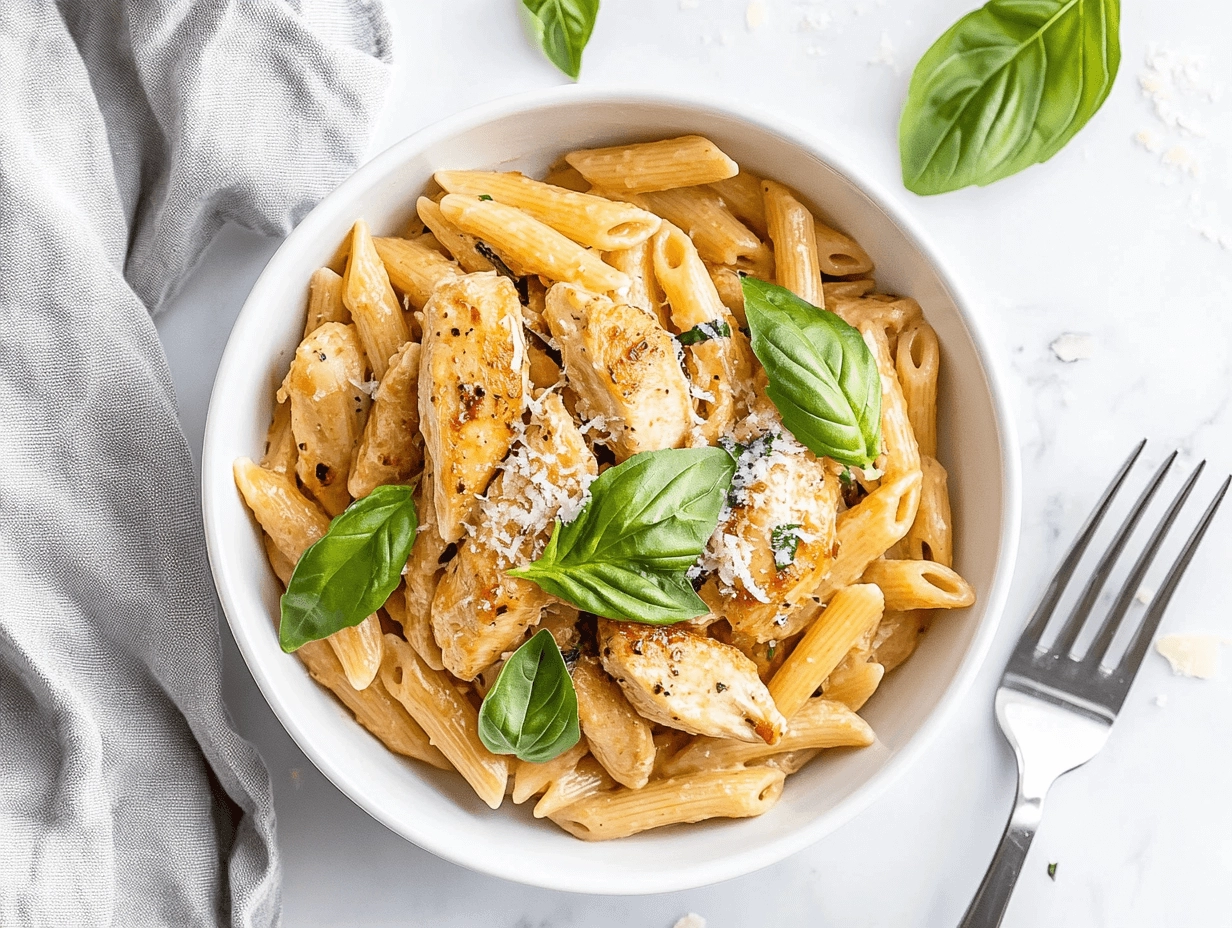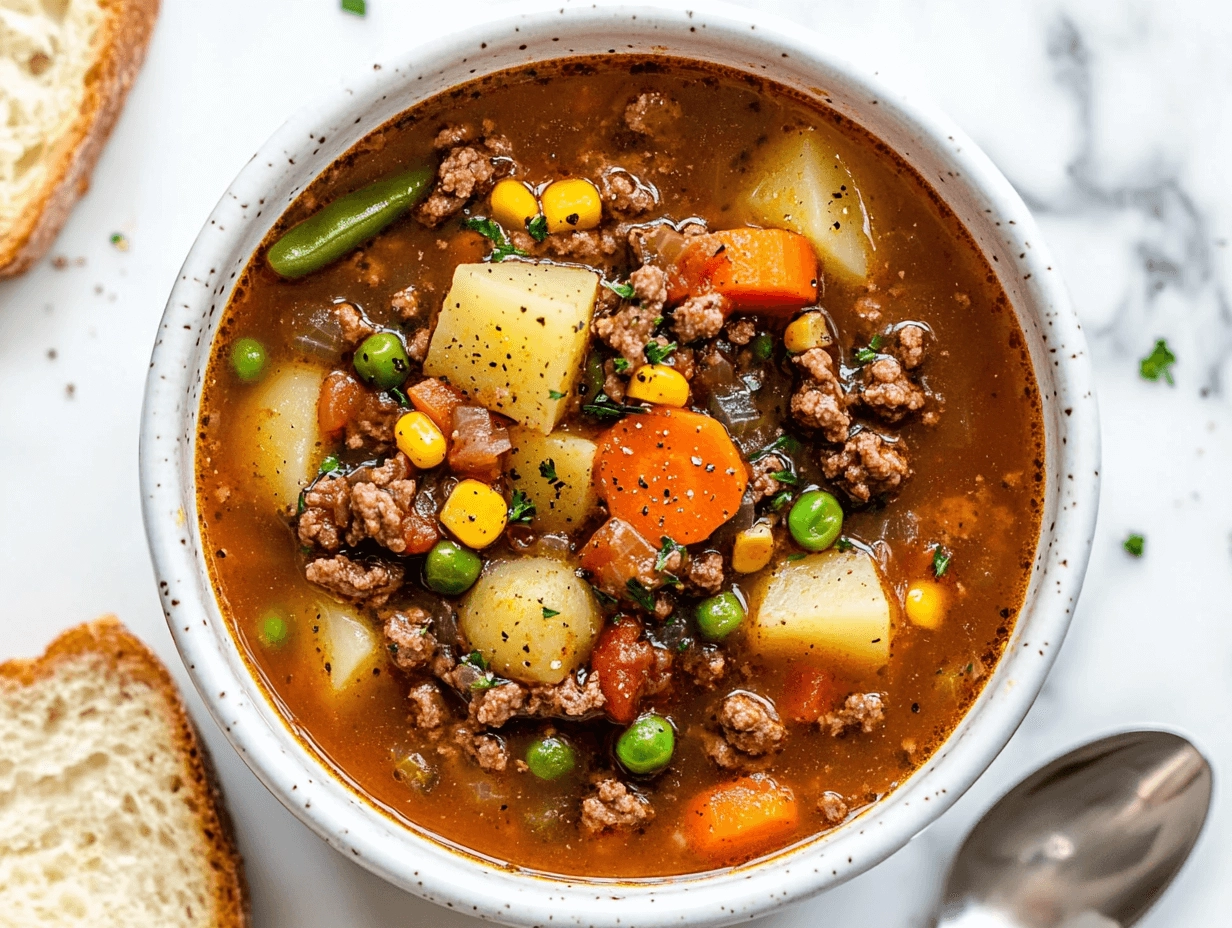Ever found yourself staring at a beverage shelf, wondering which drink truly delivers on its nutritional promises? Prime Hydration burst onto the scene, capturing the attention of health-conscious consumers and sports enthusiasts alike. Created by internet personalities Logan Paul and KSI, this drink has transformed from a viral sensation to a serious contender in the hydration market.
Understanding prime nutrition facts is key in today’s dynamic beverage landscape. Your health deserves more than just marketing hype – it demands real, transparent nutritional information. Prime Hydration offers a unique blend of hydration components, including coconut water, BCAAs, and essential electrolytes, making it more than just another sports drink.
From its modest $2.99 price point to its impressive nutritional profile of just 25 calories and 2 grams of sugar per bottle, Prime Hydration represents a strategic choice for those tracking their dietary information. Whether you’re an athlete, fitness enthusiast, or simply someone who values nutritional value, this guide will unpack everything you need to know.
Table of Contents
Discover more delicious recipes and ideas by visiting our homepage!
Understanding Prime Beverage Products Overview
Prime Hydration has quickly changed the drink market after launching in January 2022. It was started by YouTube stars Logan Paul and KSI. This brand has won over millions of young people with its smart social media ads.
Its sales have soared from $250 million in 2022 to $1.2 billion in 2023. Prime is now a big name in sports drinks and energy drinks.
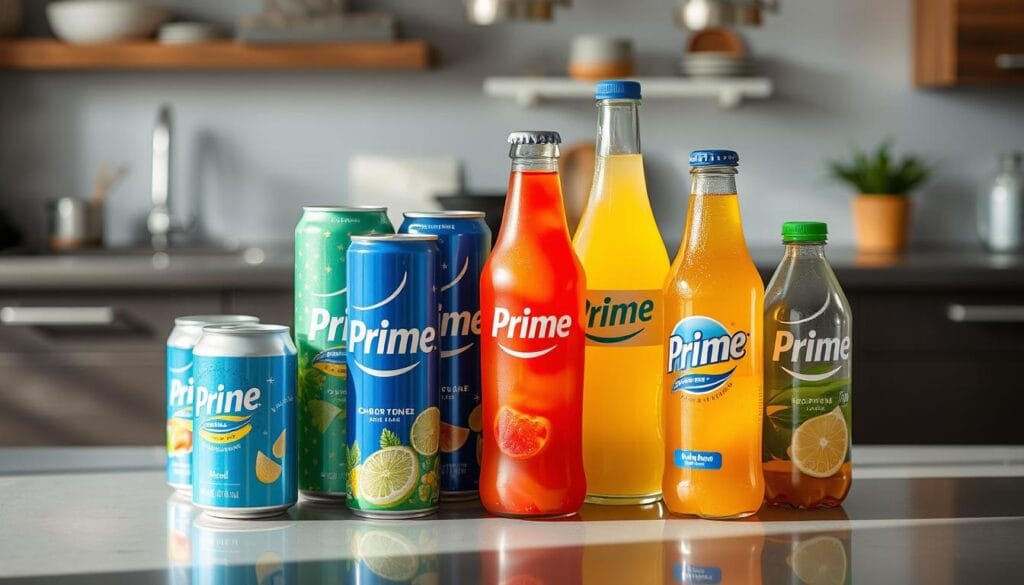
The brand’s drinks are special because of their ingredients. Prime offers many drinks to help with staying hydrated and energized. They focus on good ingredients and nutrients.
Sports Drinks and Hydration Line
Prime’s sports drinks offer a unique way to stay hydrated. They have:
- 10% coconut water content
- Electrolyte-rich formula
- Contains B vitamins and BCAAs
- Only 20 calories per bottle
- Low-sugar formulation
Energy Drink Variants
The energy drink line gives a strong energy boost. It has:
- 200 mg of caffeine per serving
- 56 mg of caffeine per 100 ml
- Designed for enhanced mental and physical performance
Special Edition Releases
Prime keeps things exciting with new flavors:
- Tropical Punch
- Lemon Lime
- Blue Raspberry
- Grape
- Regular limited-edition flavor introductions
“Our goal is to provide a clean, effective hydration solution for active individuals,” says the Prime Hydration team.
The brand keeps improving, mixing great taste, nutrition, and marketing. This helps it stay on top in the market.
Essential Prime Nutrition Facts: Ingredients and Composition
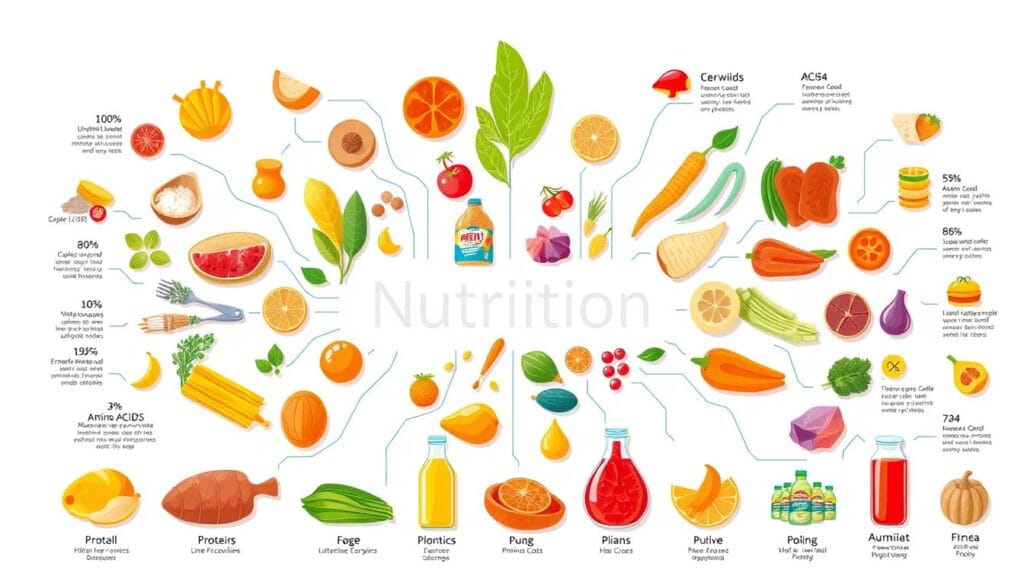
Exploring healthy eating means looking at what’s in our drinks. Prime drinks mix micro nutrients for better hydration and wellness.
Prime’s ingredients show a smart approach to nutrition:
- 10% Coconut Water: A natural hydration source
- Electrolytes: Supporting optimal body function
- B Vitamins: Enhancing metabolic processes
- Branched-Chain Amino Acids (BCAAs): Supporting muscle recovery
Now, let’s look at what makes Prime drinks special:
| Ingredient | Nutritional Benefit | Quantity per Serving |
|---|---|---|
| Coconut Water | Natural Hydration | 10% |
| Caffeine | Energy Boost | 200mg |
| B Vitamins | Metabolic Support | Complete Complex |
Reading labels is key to choosing the right drinks. Prime drinks have no added sugars and are full of good stuff. They’re great for those who care about their health.
“Nutrition isn’t about perfection, it’s about balance and making informed choices” – Prime Nutrition Philosophy
Caloric Content and Sugar Profile Analysis
Prime beverages offer a balanced approach to nutrition. They carefully mix calorie count and sweetener options for those watching their health. Knowing the nutritional facts behind these drinks helps you choose better hydration options.
The modern world wants clear information about what’s in our drinks. Prime meets this need by giving detailed nutritional profiles. These profiles meet the needs of many different diets.
Sweetener Types Used
Prime uses two main artificial sweeteners for low-calorie drinks:
- Acesulfame potassium
- Sucralose
These sweeteners let Prime make drinks with no sugar but great taste.
Calorie Comparison Across Variants
| Beverage Variant | Calories per Serving | Sweetener Type |
|---|---|---|
| Original Prime | 20 | Sucralose |
| Prime Hydration | 10 | Acesulfame Potassium |
| Prime Energy | 25 | Mixed Sweeteners |
Sugar-Free Formulation Details
Prime uses advanced sweetening tech to keep calories low. Studies show 82% of people worldwide see low-sugar products as healthier. This matches Prime’s focus on nutrition.
Our goal is to provide delicious hydration without compromising your health goals.
Electrolytes and Hydration Benefits
Knowing about prime nutrition facts for hydration is key for top body performance. Your body needs electrolytes to work well, more so when you’re active or in tough conditions.
Prime drinks are smart for keeping you hydrated and nourished. They have important electrolytes that help your body function right:
- Sodium: Keeps fluids balanced
- Potassium: Helps muscles and nerves
- Magnesium: Boosts energy
Hydration isn’t just about drinking water – it’s about replacing essential minerals lost through sweat and exertion. Prime Hydration has about 25 calories and 2 grams of sugar per serving. It’s a good choice for those who are active.
“Electrolytes are the unsung heroes of bodily performance, maintaining critical physiological functions during intense activities.”
The drink’s electrolyte mix helps keep your performance up. Studies show athletes can see drops in performance with just a 2% loss in body water. Prime’s mix of minerals from coconut water helps keep your body hydrated.
| Electrolyte | Benefit | Prime Content |
|---|---|---|
| Sodium | Fluid Balance | Moderate Levels |
| Potassium | Muscle Function | Enhanced Concentration |
| Magnesium | Energy Production | Optimal Levels |
Whether you’re an athlete, fitness lover, or need quick hydration, Prime’s electrolytes are a scientifically-backed solution. They help keep your body’s mineral balance.
Vitamin and Mineral Content Breakdown
It’s important to know the macro nutrients and micro nutrients in Prime beverages. Prime drinks have a mix of essential vitamins and minerals. They are made to help your health and wellness.
B-Vitamin Complex Exploration
Prime beverages have a strong B-vitamin complex. This complex is key for energy and cell function. The labels show a mix of B vitamins that help with:
- Energy production
- Nervous system health
- Red blood cell formation
- Cognitive function
Essential Minerals Breakdown
Your body needs minerals in the right amounts. Prime drinks add important minerals to your diet:
| Mineral | Function | Approximate Content |
|---|---|---|
| Potassium | Muscle and nerve function | 250-300 mg |
| Magnesium | Cellular energy production | 50-75 mg |
| Calcium | Bone health support | 25-40 mg |
Micronutrient Absorption Insights
Liquid delivery systems can improve nutrient absorption. Prime beverages are made to help your body use vitamins and minerals better.
“Nutrition is not just about consumption, but effective absorption.” – Nutritional Science Experts
Caffeine Content and Energy Components
Prime energy drinks have a strong caffeine kick. They offer 200 mg of caffeine per serving. This gives you a big energy boost to help you think and move better.
“Energy is the spark that transforms the spark into action” – Prime Nutrition Philosophy
Here are the key facts about caffeine and energy in Prime drinks:
- Caffeine concentration: 200 mg per serving
- Comparative analysis with other energy drinks
- Potential performance-enhancing benefits
- Targeted energy release mechanisms
To understand Prime’s energy drinks, we need to look at their nutritional value. The 200 mg caffeine is made to give you energy that lasts. It doesn’t overwhelm your body.
| Energy Drink | Caffeine Content | Sugar Level |
|---|---|---|
| Prime Energy Drink | 200 mg | Low Sugar |
| Red Bull | 151 mg | 50 g |
| Monster Energy | 160 mg | 54 g |
If you want more energy, think about how much caffeine you can handle. Prime’s energy is clean and focused. It doesn’t make you crash like other energy drinks do.
Dietary Considerations and Restrictions
Prime beverages have a lot of nutritional information. It’s important to know about healthy eating and your health. Your age and health affect how safe it is to drink them.
Nutritional labels are key to understanding energy drinks’ health effects. In the U.S., there are big dietary challenges:
- Over 75% of Americans have diets low in essential nutrients
- Nearly 80% exceed recommended saturated fat limits
- More than 60% consume excessive added sugars
Age-Related Guidelines
Prime beverages need careful thought for different ages. Caffeine affects people differently, from kids to adults. Young consumers face higher risks from energy drink consumption.
| Age Group | Recommended Intake | Potential Risks |
|---|---|---|
| Children (Under 12) | Not Recommended | High caffeine sensitivity |
| Teenagers (12-18) | Limited/Supervised | Potential sleep disruption |
| Adults (19-64) | Moderate Consumption | Monitor individual tolerance |
Health Precautions
Some groups need to be extra careful with energy drinks. Pregnant women, people with heart issues, and caffeine sensitive individuals should talk to doctors first.
“Knowing your body’s limits is the first step in responsible nutrition.” – Nutrition Expert
Be aware of your food choices. Always check nutritional labels and think about your health needs when considering Prime beverages.
Regulatory Standards and Compliance
For beverage makers like Prime Hydration, understanding regulatory standards is key. Knowing about food composition and nutritional value is vital. It helps meet strict national guidelines.
The rules for prime nutrition facts have grown more complex. Food safety groups have set tough standards to keep consumers safe. Important areas include:
- Allergen labeling protocols
- Caffeine content restrictions
- Nutritional transparency requirements
“Compliance is not just about following rules, it’s about ensuring consumer safety and trust.”
Recent changes have greatly influenced the beverage industry’s approach to nutrition:
| Regulation | Key Requirement | Implementation Date |
|---|---|---|
| FALCPA | Major Allergen Labeling | January 1, 2006 |
| FASTER Act | Sesame Allergen Inclusion | January 1, 2023 |
| FDA Guidelines | Top 9 Allergen Disclosure | Ongoing |
In recent years, the food industry has seen big changes in compliance. Nutrition data intelligence is now a must-have for makers. Over 2,500 companies worldwide use advanced strategies for compliance.
The cost of not following rules can be huge. A recall can cost a small or medium company up to $10 million. So, checking nutritional facts carefully is vital for staying in business.
Conclusion
Understanding Prime drinks’ nutrient profile is key. You need to look at their ingredients and health effects. These drinks are popular, but it’s important to see them in the context of healthy eating.
What you eat and drink matters. Prime drinks offer hydration, but they have artificial sweeteners like sucralose. They also have little branched chain amino acids and ingredients that might not be the best for you.
Think about Prime’s taste and convenience against its nutritional value. The price, from $2.33 to $2.50 per serving, shows it’s a premium product. But, you might find better health benefits in other hydration options.
Your health goals should guide your drink choices. Keep up with nutrition trends, read labels, and talk to nutrition experts. This way, you can make choices that fit your dietary needs.
FAQ
What are the key ingredients in Prime beverages?
Prime drinks have coconut water, electrolytes, B vitamins, and BCAAs. They use artificial sweeteners like acesulfame potassium and sucralose. This makes them sugar-free and offers hydration and nutritional benefits.
How much caffeine is in Prime energy drinks?
Prime energy drinks have 200 mg of caffeine per serving. This is like a strong cup of coffee. It can give you energy but might not be good for everyone, like kids or those who are caffeine sensitive.
Are Prime beverages suitable for children?
No, Prime energy drinks are not good for kids and teens. They have too much caffeine and can be harmful. Schools and health experts say kids should not drink them. Parents should think about age and health before letting kids have these drinks.
What electrolytes are found in Prime drinks?
Prime drinks have sodium, potassium, and magnesium. These help keep your body hydrated, which is important when you’re active or it’s hot outside.
Are Prime drinks sugar-free?
Yes, Prime drinks don’t have sugar. They use artificial sweeteners like acesulfame potassium and sucralose. This makes them a low-calorie choice compared to regular sports and energy drinks.
What vitamins are in Prime beverages?
Prime drinks have B vitamins like B3, B6, and B12. These vitamins help with energy, nerve function, and keeping cells healthy.
How do Prime drinks compare to other sports beverages?
Prime drinks are different because of their unique mix of ingredients, low calories, and marketing. They offer hydration, energy, and nutrients that set them apart from other sports drinks.
Are there any regulatory concerns with Prime drinks?
Yes, some countries have worries about Prime drinks. They’re concerned about caffeine levels and marketing to young people. Places like Australia, Canada, and Denmark are thinking about or have put rules on these drinks.
Can Prime beverages be used as a nutritional supplement?
Prime drinks have vitamins and electrolytes, but they’re not a full nutritional supplement. They can help with hydration and add to a healthy diet, but shouldn’t replace eating whole foods.
Are there any potentially side effects of drinking Prime beverages?
Drinking Prime drinks might cause caffeine-related issues like a fast heart rate, trouble sleeping, and feeling anxious. It’s best to drink them in small amounts and know how your body reacts.

